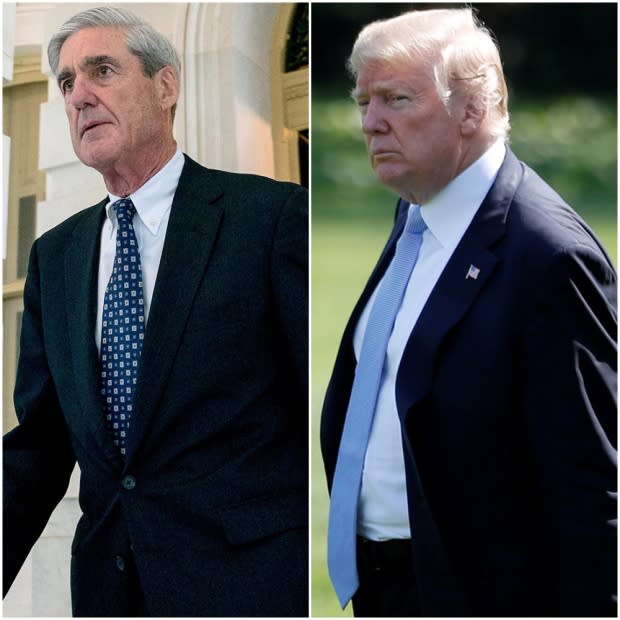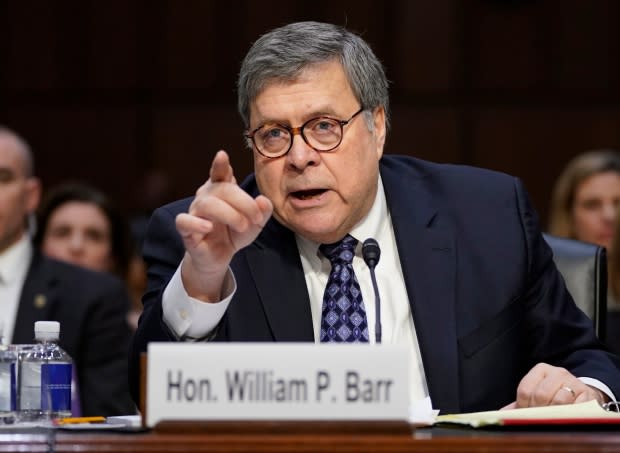Trump calls Mueller's report 'total exoneration' — but lawyers say questions over obstruction remain
It was a good day for the U.S. president. It wasn't, legal scholars say, a "complete and total" exoneration, as Donald Trump claimed in a tweet on Sunday.
A summary released on Sunday to Congress of the main findings of Special Counsel Robert Mueller's report found that Mueller's office had insufficient evidence to establish that Trump's campaign conspired with the Russians to beat Hillary Clinton in the 2016 election.
The Justice Department and the Special Counsel's Office did not charge the president or his family members with any criminal wrongdoing. Crucially, they did not charge anyone with collusion related to the election.
But when it came to obstruction of justice, Mueller explicitly did not fully absolve the president.
So his superiors at the Department of Justice did it instead.
In his four-page summary of Mueller's confidential report, U.S. Attorney General William Barr wrote that Mueller "sets out evidence on both sides of the question" of obstruction of justice.
Put another way, Mueller left open the possibility that Trump obstructed justice.
"The Special Counsel states that 'while this report does not conclude that the President committed a crime, it also does not exonerate him,'" Barr wrote.
"By those words themselves, this is not an exoneration," said Harry Sandick, a former assistant U.S. attorney for the Southern District of New York.
Mueller did not reach a conclusion on the matter. Sandick was among several former federal prosecutors surprised that Mueller opted not to make a formal recommendation on prosecution.
That decision has invited intense curiosity about what Mueller found that was possibly verging on illegality.
Watch: CBC's Ellen Mauro answered your questions on the Mueller report. To see a list of questions, visit our YouTube page.
"For me or anyone to have an informed opinion on the substance of whether that opinion by Barr ... is right, you need to know more about the evidence," Sandick said.
"If the evidence shows that the president probably committed obstruction of justice ... it would be appropriate for Congress to have that evidence."
Congress may still consider Trump's conduct to have been a high crime or misdemeanour.
'Close call'
Michael Zeldin, a former assistant to Mueller at the Justice Department, said the special counsel was communicating it was a "close call" on whether to prosecute for obstruction.
"I think it relates to the question of whether or not you can obstruct justice if you're the president when you do something which you have the constitutional right to do," Zeldin said.
Watch as Trump reacts to Mueller's report:
Trump's backers have argued, for instance, that the president has the executive authority to fire anyone, including his former FBI director James Comey, who was leading the original investigation into whether Trump campaign members colluded with Russians to influence the 2016 election.
On that issue, Mueller's team may have been deadlocked on whether to pursue prosecution.
"So Mueller punted it over to main DOJ," Zeldin said. "And two appointees of the president determined that in their estimation, a reasonable prosecutor would not bring an obstruction of justice charge on the facts they have."

Barr, a Trump appointee, said in his letter to Congress that he reached the conclusion with Deputy Attorney General Rod Rosenstein, another Trump nominee. In his summary, Barr said the lack of conclusiveness from Mueller "leaves it to the attorney general" to weigh in.
In fact, Barr had no such obligation to make the final call to exonerate Trump, legal experts said. Instead, his decision has kicked up even more dust and aroused suspicions from Democrats about precisely what Mueller found to possibly suggest Trump obstructed justice.
Congress won't be 'satisfied'
Former federal prosecutor Mark Osler was left scratching his head. He and other legal experts had expected the report to come with a recommendation.
"No way is Congress going to be satisfied with this," Osler said. "Democrats in the House will use their subpoena power and whatever else they can employ to try to make the entire report public."
Former federal prosecutor Barbara McQuade also found it odd that Mueller would defer to Barr on the obstruction question, "and odder yet that Barr himself decided the issue."
"The whole purpose of appointing a special counsel is to insulate the decision-maker from the conflicts of interest inherent to anyone in the executive branch chain of command," she said. "I think that Congress will demand to understand how this process decision was reached and whether Mueller agreed with it."
Punting the obstruction matter to Barr would seem to be a curious choice, given that Barr had already weighed in on the obstruction aspect of Mueller's work. Last May, he wrote a memo to the Justice Department criticizing the investigation's focus on obstruction of justice as "fatally misconceived."
For now, Mueller has said Trump didn't commit a crime. But the facts don't fully exonerate him either, opening the door for Congress to investigate the president's conduct.
Calls for more investigations
House Judiciary Committee chairman Jerry Nadler on Sunday called for Barr himself to testify.
As for collusion, that question appears to be more settled, though not completely so.
Quoting directly from Mueller's secret report, Barr wrote: "[T]he investigation did not establish that members of the Trump Campaign conspired or coordinated with the Russian government in its election interference activities."

Still, a probe that "did not establish" enough evidence to meet the Department of Justice's high burden isn't quite the same as Mueller's team saying they don't believe collusion occurred.
Rather, it might merely suggest the special counsel fell short of establishing proof of criminal activity that's beyond a reasonable doubt.
Congress, which is launching its own investigation, has no such burden when it comes to inquiries into abuse of power and abuse of office.
And, judging by Democratic House Majority Leader Nancy Pelosi's tweet that Barr's summary "raises as many questions as it answers," demands for the release of the full report, as well as possible subpoenas for Mueller to testify, are just beginning.
While the president will celebrate this week about being vindicated, former U.S. Deputy Assistant Attorney General Harry Litman said the obstruction point is still a big question mark.
"I'm confounded by Mueller's decision not to engage in a traditional prosecutorial judgment," Litman said. "What were the reasons there, and what evidence specifically went into the conclusions? That's critical to understand, and we don't have those answers yet."
Was the Mueller report a 'total exoneration' for Trump? U.S. politics panel weighs in on The National.
